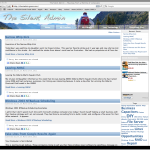I know there have been quite a few reviews on the debate of Drupal versus WordPress but I feel I’ve got to put in my 2 cents worth. For those who are looking for a clear cut answer one way or the other, you might want to keep looking as you won’t find that answer here. What you will find are my thoughts on each and experiences with both platforms. You’ll also find out why I continue to use both but make a decision founded in what the expectations for the website.
For a little background, I’ve developed websites for various companies since 1994 and in those days it was all handcoded. ‘vi’ was my friend and as others did, I copied liberally from one site to another. There were some glimmers of hope to website developers in the forms of HTML editors but the real breakthrough came with content management systems (CMS). Now one could truly separate form from function and consistency in style throughout a website was easily maintained. Of course it also helped that the various standards bodies kept pace to a degree with technology and the rapid adoption of style sheets, javascript, JAVA, and other technologies helped to accelerate the web to what we experience now on a day-to-day basis.
I’ve used various open source content management systems over the years beginning with WebGUI in 2002. I remember looking in 2001 for a content management system that I could turn over to my clients and the promise of WebGUI 3.0 which was delivered in January 2002, held hope for me. It’s been a rough and tumble nearly 10 years looking at systems, training clients and in the end discovering that all too often the client really doesn’t want full control of their website. Adding a new message here or there seems to be the reality for many companies I’ve dealt with but I digress. Nearly 4 years ago, I went out searching again for a full featured, open source content management system with the promise of easy administration and I ended up choosing Drupal. I’ve implemented a number of sites with Drupal and have been generally satisfied with the community support, richness of available plugins, and timeliness that security issues are dealt with.
Fast forward to today — my husband wanted a website where he could post his thoughts with the threat that he would just use ‘vi’ and craft his own pages if I couldn’t find something easy to use. I implemented a site in Drupal for him and Jim struggled for a long time with issues surrounding ease-of-use. So it was time to go on a search again and see if there was a solution for him. I’d looked at WordPress several years ago but it wasn’t mature enough in my mind. I took another look and wow — times have changed. WordPress had matured considerably over these last few years and I selected it as the platform for Jim’s new blog — “The Silent Admin”.
Now this does not mean I’ve abandoned Drupal — in fact I’m working on another swim club website using Drupal. Each system has it’s pluses along with minuses and so it’s how you expect to use and interact with the end product that should determine which CMS to use. The beauty of Drupal and WordPress is that they have many similarities and you don’t have to make a decision to go with only one particular system. I expect as time goes on, we’ll see these two open source CMS platforms become more and more similar.


